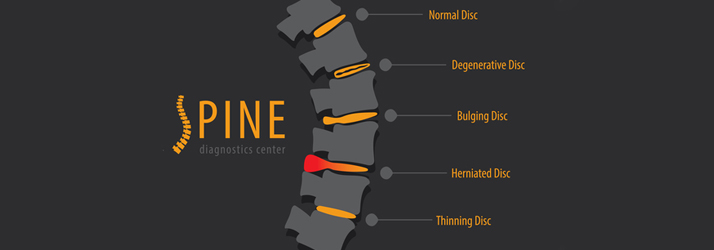Herniated Disc Treatment in Lexington KY

Between each individual vertebrae in our spine are cushioned disks that absorb shock and prevent the vertebrae from grinding against one another. These discs have a rubbery exterior called the annulus and a softer, jellylike center called the nucleus. A herniated disc, also sometimes called a bulging disc or a slipped disc in Lexington KY, happens when there is a tear in the annulus and a portion of the nucleus comes out through that tear. This slipped disc can then put pressure on nearby nerves irritating them. Herniated discs, also known as bulging discs or slipped discs, can occur in almost any part of the spine, though they are most commonly seen in the lower back.
What are the Signs You Have a Bulging Disc in Lexington KY
While some people who have herniated discs experience no symptoms, others can experience symptoms including muscle pain (such as sharp stabbing or burning sensation), numbness, tingling or weaknesses in their back and/or extremities, headaches, or the inability to freely move without pain or stiffness. The location of the herniated disc in the spine and how hard it is pressing on the nerve can affect the symptoms or the severity of the symptoms that a person feels. For example, a bulging disc in lower back may result in symptoms that are felt in the buttocks, thigh, calf, or foot while a bulging disc in the neck may result in pain, numbness, or weakness in the shoulders and arms. However, no matter where your herniated disc is located, whether that is in your neck, upper back, or if you have a bulging disc in lower back, certain actions or motions like coughing, sneezing, or some movements may exasperate the symptoms.
Seek medical attention for your slipped disc as soon as you experience pain that travels from your back to an extremity, or if you experience any of the other tell-tale symptoms of a herniated disc including numbness, tingling, or weakness in your arms or legs. Occasionally, a bulging disc in lower back may cause additional and serious complications if it compresses the entire spinal canal affecting the cauda equina, the group of long nerve roots at the end of our spine. Signs of this serious condition may include bladder or bowel dysfunction; a loss of sensations in the inner thighs, back of legs, and the area around the rectum; or the inability to complete routine daily activities because of worsening pain, numbness, or weakness. In this rare occasion, surgery may be needed to avoid permanent damage, however, for most cases of herniated discs treatment is non-invasive.
What are the Causes of a Slipped Disc?
There is no singular cause for herniated disks, rather the condition is believed to have several possible contributors. The most common factor contributing to a slipped disc is often age-related. As we grow older disks naturally degrade and wear down from use; they become less flexible making the annulus more prone to tearing resulting in more herniated discs the older we get. There is also a risk for bulging discs when lifting heavy objects if you are putting strain on your back during the lift instead of your legs and thighs. Lifting and turning is another way one might slip a disk; however, the condition is not often the result of a fall or a blow. There are also certain risk factors that may increase your likelihood of getting a herniated disk.
Risk Factors for a Herniated Disk
- Weight: The more weight your body is carrying the more stress it causes on the muscular and skeletal systems in the body because they have to support that weight. Since increased weight increases the stress on the back and spine it becomes a risk factor for herniated disks.
- Smoking: Smoking has been associated with the expedited breakdown of the disks between our vertebrae due to lower oxygen supply in the body, and these weakened discs are more likely to rupture and cause bulging discs.
- Work: Since physical activity, like lifting heavy objects, can contribute to developing a herniated disk, jobs that require physical labor, especially repetitive movements, have a correspondingly higher risk for a herniated disk. Occupations that require long stretches of sitting can also pose a risk if proper posture is not maintained as this kind of repetitive long-term action can increase the risk for a bulging disk in lower back or shoulder area of workers.
- Genetics: There is a predisposition to herniated disks that can be inherited genetically, and so it can be helpful to be familiar with medical conditions common in your family lineage. Certain diseases, like osteoarthritis, can also increase the risk of a herniated disk because they affect the skeletal system including the spine.
Preventive Steps for Avoiding a Herniated Disk
- Weight Control: Since excess weight poses a risk for herniated disks, maintaining a healthy body weight can help prevent slipped disks.
- No smoking: Another risk factor that can be avoided is smoking and doing so will help prevent increasing your risk of future herniated disks.
- Body Awareness: Certain movements can contribute to the possibility that you will get a bulging disk, so being aware of how you’re using your body is key in preventing those risks. Sit up straight, pay attention to your posture, lift with your legs; be sure the way you’re using your body is not putting undue or unneeded stress on your back or spine.
- Muscle Strength: Your body’s muscles are what support your spine and stabilize your core, so it’s important they are up for that job. Strength training and exercise help build strong muscles, which helps prevent future bulging discs.
Chiropractic Care for a Herniated Disk
Chiropractic adjustments can help relieve the pressure that the bulging discs create on the spinal column. Once pressure on the nerve is alleviated the painful symptoms of a herniated disc will also subside. The time frame for healing a bulging disk depends on individual circumstances and whether the offending bulging disc is in lower back, upper back, or neck region of the spine; however, bulging discs usually heal in a few months with continuous treatment. Chiropractic care for slipped disks can help speed up the healing process and give you tools to use in the future to prevent additional spinal issues like performing spinal alignments and teaching you muscle-strengthening exercises to focus on your specific injury.
Pelphrey Chiropractic offers relief to those in central Kentucky suffering from back pain and discomfort caused by a herniated disc because at Pelphrey Chiropractic pain doesn’t have to be permanent.
Pelphrey Chiropractic is located in Lexington KY at 616 Wellington Way Suite A. We serve the greater Lexington, KY area. Contact us today for your first step in herniated disc treatment!
Monday
8:00am - 12:00pm
2:00pm - 6:00pm
Tuesday
2:00pm - 6:00pm
Wednesday
8:00am - 12:00pm
2:00pm - 6:00pm
Thursday
2:00pm - 6:00pm
Friday
8:00am - 12:00pm
2:00pm - 6:00pm
Saturday & Sunday
Closed
Pelphrey Chiropractic
616 Wellington Way Suite A
Lexington, KY 40503
Call: (859) 296-4889
Text: (859) 407-7486

